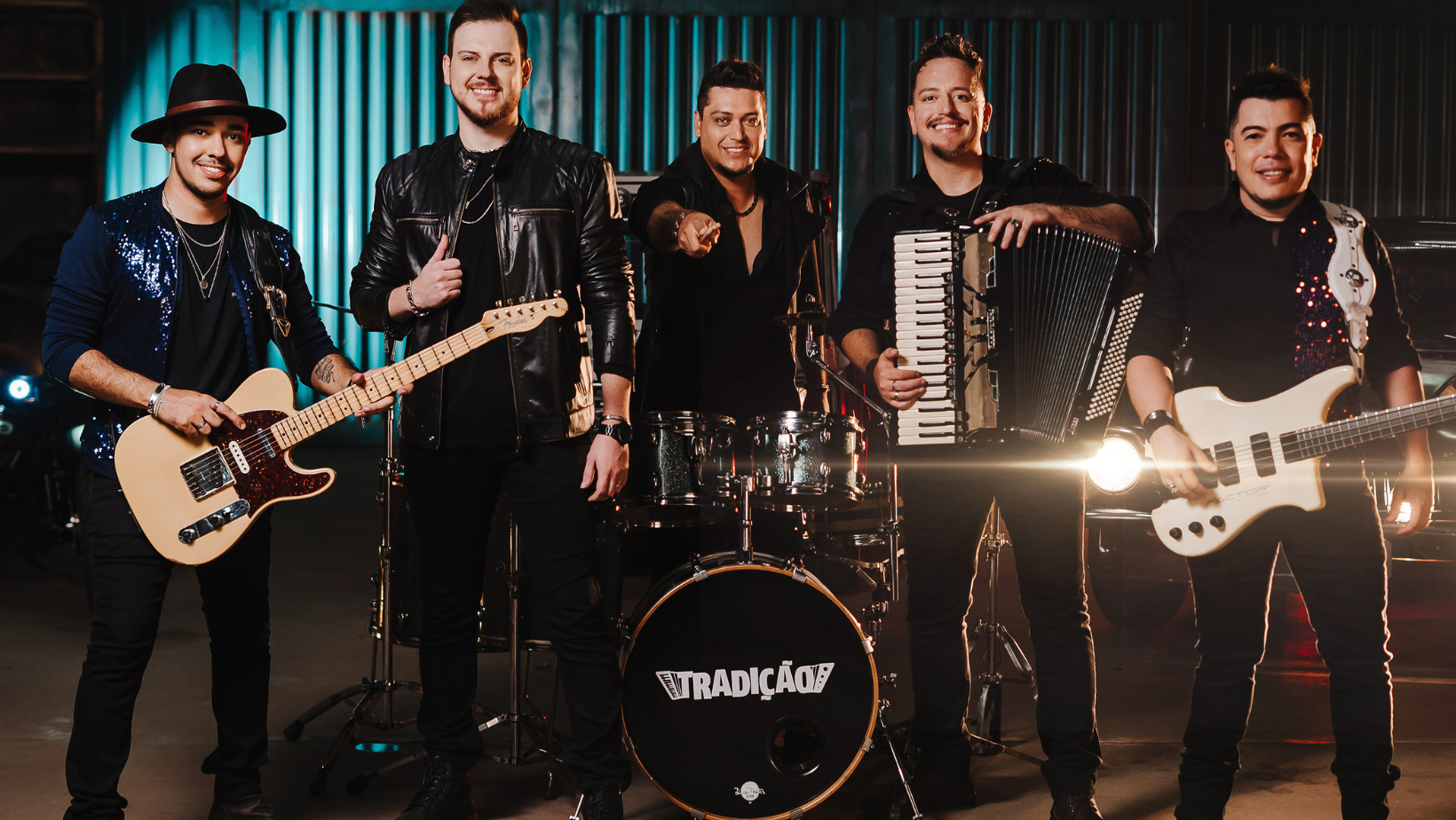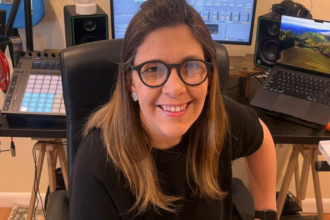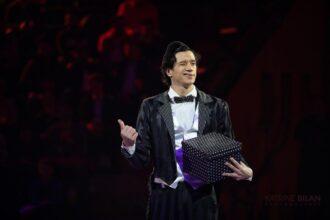Grupo Tradição, founded by Wagner Braga Hildebrand, was born from the passion for music and the influence of a party family. Inspired by his parents and brother, Wagner gathered talented friends to form the group that quickly conquered its space. “The idea of founding Grupo Tradição came from family gatherings where I always took the accordion, and soon a dance was formed. Friends and relatives encouraged me to set up a group, and thus Tradição was born”, shares Wagner. The name was a suggestion from his father-in-law, Dirceu Moreira, reflecting his commitment to cultural roots.
In 1995, the group reached an important milestone with a dance at Fiscosul, in Campo Grande, MS, which marked the beginning of a successful career. “We rehearsed for 20 days straight to prepare a repertoire that could be played for 3 hours without a break. We went on stage and found an audience eager to dance. It was a unique moment and, from then on, we never stopped”, recalls Wagner. The first line-up, with Sérgio Ovelar, Paulo, Chiquinho, Valdenézio and Carlão, began playing at weddings, birthdays and promotional parties, winning over the local audience.
Over the years, Grupo Tradição evolved, incorporating new rhythms and influences without losing its essence. The transition to Universal Music in 2000, driven by the success of the song “Brasileira”, led the group to national recognition. “We participated in the Chitãozinho and Xororó tour, which put us on the music charts and brought new festive commitments. Tradição began to be part of the show schedules of important festivals in Brazil”, says Wagner. Today, with almost three decades of history, the group is preparing to celebrate this milestone with new projects, digital releases and an even stronger presence on the music scene.
How did the idea of founding Grupo Tradição come about and what was the initial process of forming the group like?
My biggest supporters were my parents, José Pires and Cecília, and my brother Warley. My family has always been party people. At family gatherings, I always took the accordion, and it didn’t take long for a dance to form. So, friends and relatives encouraged me to set up a group. I had the honor of inviting my friends Sérgio Ovelar (guitar), Paulo (bass), Chiquinho (accordion), Valdenézio (solo guitar) and Carlão (drummer), our first line-up, to play with me. I chose the name Tradição at the suggestion of my father-in-law, Dirceu Moreira, and also because I was a member of a family group that held parties on farms, private parties, called “A Tradição Continua”. This formation worked together for a few years. We played at weddings, birthdays and promotional parties.
The name “Tradição” reflects a commitment to cultural and musical roots. How is this philosophy reflected in the choice of repertoire and the group’s identity?
Mato Grosso do Sul, located in the Center-West of Brazil, received cultural influence from various peoples, such as Gauchos, Northeasterners, Minas Gerais, Paraguayans and others. Knowing this miscegenation, the first idea was to record, musically, what was heard at night in our state. I believe this vision pleased our audience, as we played a little bit of everything, always striving for rhythmic quality.
Can you tell us about the importance of the ball at Fiscosul in 1995 as a starting point for Grupo Tradição?
We rehearsed practically 20 days in a row. We prepared musical selections and a repertoire that could be played for 3 hours straight, without a break. We went on stage and found an audience eager to dance. Unique moment in our lives. Our contractor, my brother Warley, was also apprehensive. Director of Ceremonies at Fiscosul, he had the responsibility of providing a good musical attraction to please members. Thank the good Lord, it was a wonderful party. We made new commitments and, from then on, we never stopped.
Over the years, Grupo Tradição has undergone some changes in its formation. How have these changes influenced the group’s sound and dynamics?
Maintaining a group with several components is not an easy task. Professional and private commitments began to mix, and soon changes began to happen. At first, there is sadness about the departure of some partners, but, with the arrival of others, motivation is renewed, new ideas emerge and, always focused on performing professional work, overcoming comes. All the new members joined because they admired the work the group was already doing. So, the idea was to maintain what was done and, little by little, experiment with new musical formulas.
How was the transition of the group from Campo Grande, MS, to other regions of Brazil? What were the challenges and opportunities encountered in this process?
With the group feeling mature, we decided to record a live CD. Register our work in full. A big party, a real dance. The idea was for the listener to put the CD on and not remove it until it was finished. And so we did, and we were happy. This album took us beyond our state border. We started composing more and had the initiative to merge traditional rhythms. An example of this was the composition “A Brasileira”, a mix of spicy gaucho vanerão with Bahian percussion, another great achievement. This hit put us on the music charts of several radio stations. Soon, new festive commitments appeared and Tradição began to be part of the show schedules of important festivals in Brazil.
You had four CDs recorded locally before signing with Universal Music. What was this transition like to a national record label and how did it impact the group’s career?
The “live CD” that contained the song “Brasileira” arrived in the hands of the duo Chitãozinho and Xororó, through our friend Luís Gustavo Garcia (music producer and bassist for the duo). That was when they invited us to participate in the tour held at the old Olympia concert hall, in São Paulo. On that occasion, directors from the record company watched our performance. Everything seemed like a dream, and when we saw each other, we were recording for Universal. It was a wonderful period. We made televisions and our songs were playing on the main radio stations in Brazil. A milestone for our career.
Grupo Tradição incorporated new rhythms into their music when expanding to other regions of the country. How to balance the musical tradition of Mato Grosso do Sul with new influences?
Everywhere the group performs, we make a point of saying that we are from Mato Grosso do Sul. We are proud of our land and our origins. The Brazilian people are eclectic and party-loving. When we play the Chamamé, a traditional rhythm in our state, in the cities of the Northeast, people stop to listen and then begin to sway, understanding that it is a party. Then, we started with music from the region, showing that the group cares about learning the local culture. Everything becomes forró. In the same way, we are happy when we see that ideas that emerged from our group are part of the reality of festivals in our Brazil. An example of this is the Micareta Sertaneja project, a successful project that was recorded on two CDs and two DVDs. Country music transformed into axé music rhythm. A contagious mix, endless joy.
In addition to music, is Grupo Tradição involved in other cultural or community activities?
We have already participated in cultural workshops, music schools and charitable projects. We like to pass on our experiences to younger musicians and bring joy to people.
What is the process of creating and selecting the repertoire for Grupo Tradição albums?
When we are at our headquarters, Campo Grande, we hold weekly meetings to improve our shows and adjust our repertoire. These encounters inspire us to compose. Each member brings ideas from home and, together, we begin to polish them. We went into the studio, recorded it and then put it out there to discuss whether or not we would release it to the market. We have a lot of new songs saved for the right moment.
What are the group’s future plans? Are there any new projects, tours or musical collaborations on the horizon?
We are about to celebrate three decades of Grupo Tradição’s history and we are preparing a special project to celebrate this milestone in our career. Furthermore, we are intensifying our presence on digital platforms with releases scheduled every 45 days, investing in new video clips and songs. Our fans always ask us for news and good songs, so we are working hard to bring new compositions and recordings, improving our repertoire and bringing a very lively show throughout Brazil.
Follow Tradição Group on Instagram





